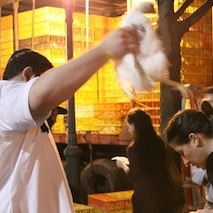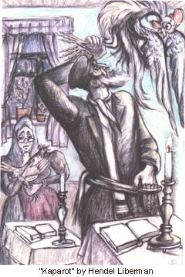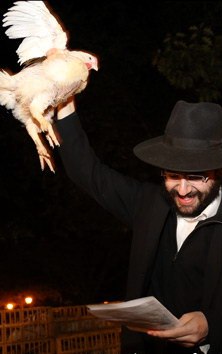
Banner

Did SPCA pounce at 11th hour & stop ‘kaporros’?
Published
10 years agoon
By
adminANT KATZ
Not so, says SPCA Sandton Inspector Lilly Motsemme, who had visited Torah Academy yesterday. She is adamant that the SPCA had not ordered any type of order banning the process, nor do they have any interest in the slaughter of animals in abattoirs, she says.
“We have many other communities who are (ritually) slaughtering in South Africa,” she told Jewish Report today. “Our concern is only about the welfare of the animals.”
 But an e-mail sent to members of the community yesterday stated:
But an e-mail sent to members of the community yesterday stated:
“Due to unfortunate developments, the SPCA has prohibited the use of live chickens for kapporos. Accordingly, kapporos should be held by either using fish or money. For further details on these alternatives, please contact your Rov. Best wishes for a Gmar Chasima Tova.”
Whoever issued the stop-order on this evening’s proceedings, be it religious authorities as a preventative measure, or the Sandton SPCA, the fact is that many hundreds, some say thousands of Jews will not be partaking in the pre-Yom Kippur ritual cleansing process as they had planned this evening.
SACA insists they’re not after schecting
Motsemme insists she had heard that a ritual slaughtering ceremony was going to take place and went to TA yesterday to ask when and where it was going to happen so that the SPCA could observe the practice. The SPCA had recently been made aware of the practice, she says, but nobody at TA would give her any information.
“Even now I am trying to get to know about it,” she told Jewish Report. She had nothing to do with any prohibition, she insists. “We didn’t come across anyone who would tell us anything, so we left,” she says.
Asked if there was any intention on the part of the SPCA to investigate schechita generally, Motsemme said the SPCA generally does not get involved in abattoir slaughtering processing and insisted that their current interest was in kaparot.
But the kosher community remain concerned
One prominent local haredi Jew, who spoke to Jewish Report on condition of anonymity, said he was concerned that this could have an effect of kashrut in general.
“During the kaparot process, the chickens are slaughtered by a schochet in the same way they would be in an abattoir,” he said. “Of course we should be worried if the SPCA has the power to change the manner in which we slaughter our chickens.”
The unidentified informant said he planned to look at the legal options available to the community immediately after the high holidays.
The Jewish counter-view
“My view is that there is a good argument that it would be a violation of the Animal Protection Act – it can cause suffering to the animals,” says David Bilchitz, professor of the Department of Public Law at the University of Johannesburg. Prof Bilchitz is an outspoken animal rights activist who has spoken on the subject of kaparot at Limmud and earlier this year wrote a letter to the Jewish Report on the subject.
READ: Animal Cruelty & the Ritual of Kapparot
What is kaparot or kapporos?
 According to CHABAD.ORG (the following is being published verbatim): It is customary to perform the kaparot (symbolic “atonement”) rite in preparation for Yom Kippur.
According to CHABAD.ORG (the following is being published verbatim): It is customary to perform the kaparot (symbolic “atonement”) rite in preparation for Yom Kippur.
The rite consists of taking a chicken and waving it over one’s head three times while reciting the appropriate text. The fowl is then slaughtered in accordance with halachic procedure and its monetary worth given to the poor, or, as is more popular today, the chicken itself is donated to a charitable cause.
We ask of G‑d that if we were destined to be the recipients of harsh decrees in the new year, may they be transferred to this chicken in the merit of this mitzvah of charity.
In most Jewish communities, kaparot is an organised event at a designated location. Live chickens are made available for purchase, ritual slaughterers are present, and the slaughtered birds are donated to a charitable organisation. Speak to your rabbi to find out whether and where kaparot is being organised in your area.
The details
The timing
Kaparot can be done any time during the Ten Days of Repentance (ie between Rosh Hashanah and Yom Kippur), but the ideal time is on the day preceding Yom Kippur during the early pre-dawn hours, for a “thread of Divine kindness” prevails during those hours.
The chicken
Several reasons have been suggested for the choice of a chicken to perform the kaparot rite: 1) In Aramaic, a rooster is known as a gever. In Hebrew, a gever is a man. Thus we take a gever to atone for a gever. 2) A chicken is a commonly found fowl and relatively inexpensive. 3) It is not a species that was eligible for offering as a sacrifice in the Holy Temple. This precludes the possibility that someone should erroneously conclude that the kaparot is a sacrifice.
It is customary to use a white chicken, to recall the verse (Isaiah 1:18), “If your sins prove to be like crimson, they will become white as snow.” In any event, one should not use a black chicken, as black is the colour that represents Divine severity and discipline. Nor should one use an obviously blemished chicken.
A male takes a rooster; a female uses a hen. Ideally every individual should use their own chicken. If, however, this is cost prohibitive, one fowl can be used for several individuals. So an entire family can do kaparot with two chickens – one rooster for all the males and one hen for all the females.
In the event that more than one person share a kaparot chicken, they should do the kaparot together, not one after the other. For one cannot do kaparot with a “used” chicken.
A pregnant woman should perform kaparot with three chickens – two hens and a rooster. One hen for herself, and the other hen and rooster for the unborn child (of undetermined gender). Or, if this is too expensive, one hen and one rooster will suffice (and if the foetus is female, she shares the hen with her mother).
If a chicken is unavailable, one may substitute another kosher fowl (besides for doves and pigeons, as they were offered as sacrifices in the Holy Temple). Some use a kosher live fish; others perform the entire rite with money, and then giving the money – at least the value of a chicken – to charity.
The ceremony
- Take the chicken in your hands and say the first paragraph (“Children of man who sit in darkness…”)
- When reciting the beginning of the second paragraph, wave the chicken over your head in circular motions three times – once when saying: “This is my exchange,” again when saying “This is my substitute,” and again when saying, “This is my expiation.”
- Repeat the entire process another two times. (Altogether waving the chicken over your head nine times.)
- Rest both your hands on the bird – as was customarily done when bringing a sacrifice in the Holy Temple.
- Take the chicken to the shochet (ritual slaughterer), who slaughters the bird.
- Here’s your chance to fulfil a relatively rare biblical mitzvah – that of covering the blood of a slaughtered bird. Take a handful of dirt (usually made available in the area) and recite the following blessing before covering the blood:
Baruch attah Adonai Eloheinu melech haolam, asher kidishanu b’mitzvotav v’tzivanu al kisui hadam be’afar.
(Blessed are You, L‑rd our G‑d, King of the universe, who has sanctified us with His commandments and commanded us concerning covering the blood with earth.).
- It is customary in many communities to tip the shochet for his service.
- If you’re reluctant to hold a live chicken in your hands, someone else can hold the chicken and wave it over your head.
Even the smallest of children are traditionally brought to kaparot, and one of their parents waves the chicken over the child’s head, while saying: “This is your exchange, this is your substitute, this is your expiation…”
It is of utmost importance to treat the chickens humanely, and not to, G‑d forbid, cause them any pain or discomfort. Jewish law very clearly forbids causing any unnecessary pain to any of G‑d’s creations. The repugnance of such an unkind act would certainly be amplified on this day, the eve of the day when we beseech G‑d for – perhaps undeserved – kindness and mercy.
In fact, the Code of Jewish Law suggest that we take the innards and liver of the kaparot chickens and place them in an area where birds can feed off them. “It is proper to show mercy to the creatures on this day, so that in Heaven they should have mercy upon us [too].”
The same procedure outlined above is followed – sans the ritual slaughterer – if using fish or money for kaparot.
What do you think?
Post your comments below.





DANIEL
Oct 2, 2014 at 3:00 pm
‘Since when is the SPCA the police?
‘
Carin
Oct 2, 2014 at 10:39 pm
‘
‘
Gary Selikow
Oct 3, 2014 at 7:28 am
‘If we can use money and spare an innocent animal unnecessary suffering, why not do so?’
Gary Selikow
Oct 3, 2014 at 11:10 am
‘The SPCA should be given more power to protect animals, not less’
Candy
Oct 3, 2014 at 1:20 pm
‘Unnecessary cruelty to these innocent animals warrants money as a more appropriate substitute. ‘
abu mamzer
Oct 5, 2014 at 5:02 am
‘cruelty to chickens?
I love the Kapparot ceremony,no fun sport in animal killing where the animal sacrificed is stuffed and not taken for food.
Since the blood libel against Jews is still a realistic fantasy and still believed in both by Christians and Moslems,this simple ceremony is evidence that the only animal sacrificed is a lowly chicken from which all the blood is drained and then is donated or eaten,is witness that there is no human sacrifice ever for Jewish ritualistic practices.Most pictures I’ve seen show humble yidden,doing this custom who have probably never killed a fly in their whole lives.
All those who oppose Kapparot should not forget the simple moral lesson that slaughter begins and ends only with animals that are kosher,and without cruelty whatsoever.
Call it the cult of the chicken,az mah?
SPCA? Society for the Prevention of Cruelty to ANC mambas?’
Lisa
Oct 5, 2014 at 5:56 pm
‘There is a definite line between freedom of speech and hate speech and abu mamzer has crossed it. After the Leon Reich debacle I am surprised that this letter was actually published rather than deleted. Open debate is one thing but racist speech is quite another’
Shirley
Oct 5, 2014 at 7:28 pm
‘Since when is any living, sentient being ‘lower’ than any other? We know better today about how all species suffer the same terror and pain.
Please substitute cash.’